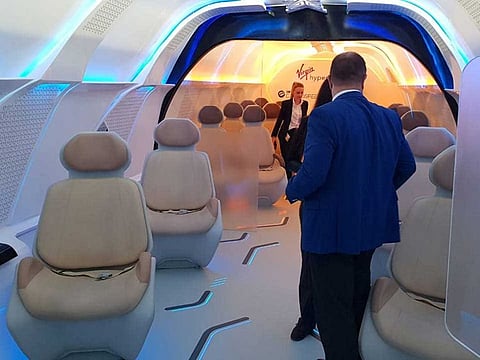Dubai-Abu Dhabi trip in 12 minutes, UAE gears up for self-driving journey
Pilot tests are on as Gulf cities prepare themselves for ‘smart mobility’ services

Dubai: How soon will it take for residents in UAE and other Gulf states to get into a driver-less public transport service? Not that long... if the $50 billion worth of “smart city” projects the UAE and Saudi Arabia will spend in the next five years get the desired results.
A significant portion of these investments will be on next-generation “smart mobility”, which could take the form of self-driving vehicles, and even those of the flying kind.
“The RTA (Roads and Transport Authority) in Dubai has successfully tested driverless shuttles as well as pilotless flying taxis, whose deployment is expected to contribute to making 25 per cent of trips in the city driverless by 2030,” said Mark Haddad, Principal at the consultancy Strategy&, part of the PwC network.
Then there is the “hyperloop” option, which could in future - if all the plans slot into place - could deliver passengers and freight to their destinations in a matter of minutes rather than hours. (A Dubai-Abu Dhabi trip could be done in 12 minutes - at least that’s the promise offered by hyperloop, which essentially uses low pressure air tubes to ferry pods over vast distances at eye-popping speeds.)
“Gulf states are positioning themselves at the forefront of the mass transit revolution through their interest in the hyperloop,” said Haddad. “This is evident from several strategic partnerships between hyperloop companies and Gulf states to encourage research and the rapid commercialization of this technology.
“Virgin Hyperloop has a strategic partnership with the Economic Cities Authority of Saudi Arabia to study and build the longest test and certification hyperloop track (35 kilometres) as well as an R&D centre and manufacturing facility. Hyperloop One has an agreement with RTA to evaluate the feasibility of a link between Dubai and Abu Dhabi.
Mindsets need change as well
But putting up the funds on smart mobility is only part of it. How fast will the adoption rates be?
“Many hurdles need to be overcome before the full commercialization of autonomous vehicles in the next few years - three to five years at minimum,” said Haddad. “These include:
* The rapid evolution of the technology, especially the “vision” aspect and maturity of HD (high-definition) maps;
* The governments’ approach in enabling driverless mobility through solid framework/regulations (common standards, liabilities, safety, data privacy, cyber security, etc.):
* Proper infrastructure allowing better connectivity;
* Crafting the right partnerships and incentives with technology and service providers; and (of course)
* End-users’ acceptance of the new technology.”
For now, metros and urban rail networks
But as they seek out next-gen mobility, Gulf states are also making sizable commitments in frill-free rail transportation services. In its new report, Strategy& notes that the “biggest urban transport project currently underway in the region is Riyadh Metro, a $23 billion project featuring six lines and 85 stations. Jeddah, Mecca and Madina have plans for development or the expansion of urban transport and metro projects.
In Kuwait, a $7 billion metro project is “back on track after plans to proceed to the next stage were approved”. The 160 kilometre system, due to be built over five phases, is expected to include 68 stations and four lines.
All of this will be the foundation for the Gulf’s push towards smart cities. But such a transition needs a tight regulatory regime. The Strategy& report notes that “smart mobility requires an appropriate governance framework and regulations. The rapid pace of technological development means that ministries and city authorities have to coordinate governance across disciplines and institutions to ensure that new solutions and business models are fair, accessible, equitable, and sustainable.”
“For instance, many governments will need to revamp the way they license and regulate vehicles to accommodate smart technologies,” said Dr. Ulrich Koegler, Partner with Strategy& Middle East.
Get those details in place and user acceptance will come on their own.
Sign up for the Daily Briefing
Get the latest news and updates straight to your inbox


_resources1_16a30b3cc87_medium.jpg?w=320&auto=format%2Ccompress&fit=max)





